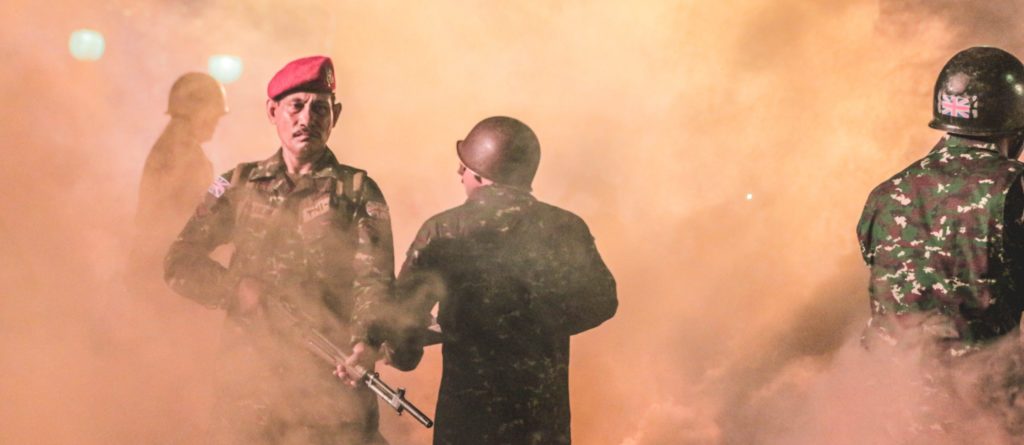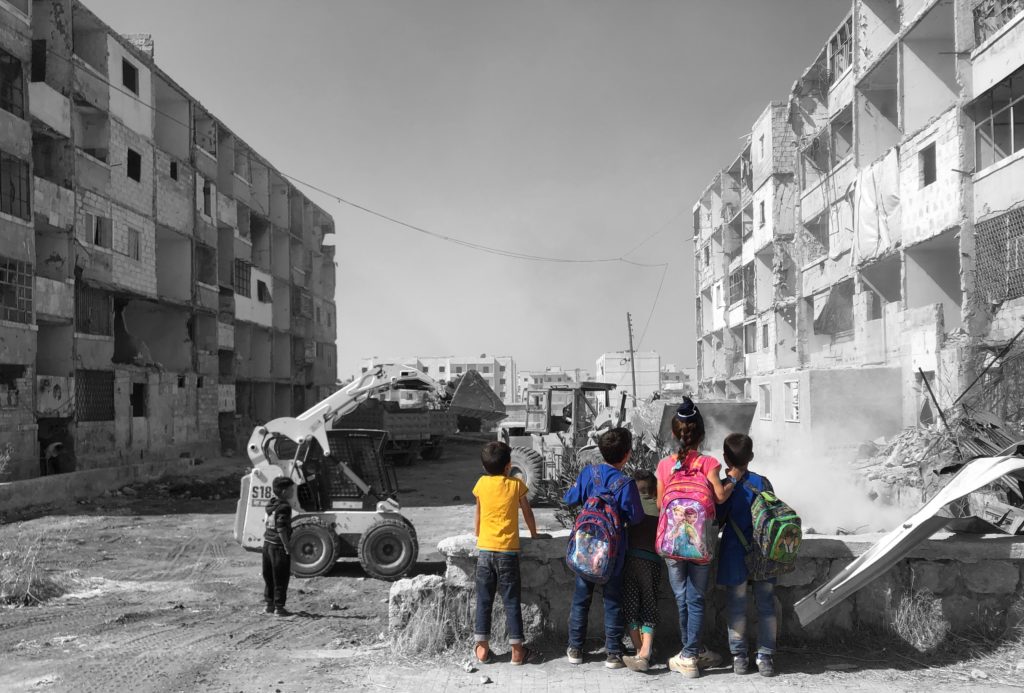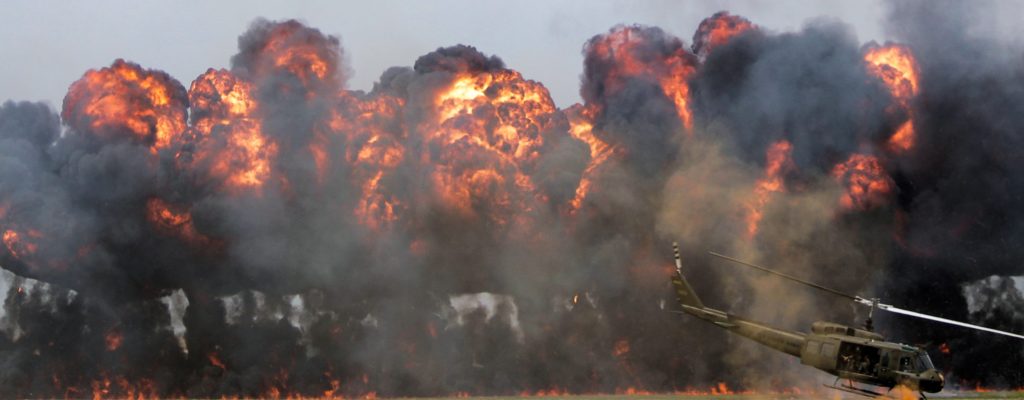
Demonizing the Enemy
The Manipulation of Shadow Projections
In any conflict, an essential aspect of mobilizing collective opinion to justify the regression to predatory or pathological behaviour is the demonizing or dehumanizing of the enemy and the presentation of the conflict as a simplistic one between victory and defeat, good and evil, right and wrong, thereby effectively polarizing two groups or nations and transforming them into enemies.
Strategic lying to promote national interests has long been part of the repertoire of political leaders and fear-mongering is part and parcel of this repertoire.
But it is precisely in these situations that we risk falling under the polarizing spell of solar mythology and into a state of possession by the unconscious shadow. Totalitarianism follows on from the process of demonizing another group —naming one group as ‘good’ and the other as ‘evil’. The ‘good’ group may be trying to hold down another within a nation, as in modern Syria, or it may be trying to control another nation that presents a threat to it, as in India or Pakistan, or it may be reacting against a future imagined threat, as with the United States and the United Kingdom and the threat posed by Saddam Hussein. Then the belief is promoted: if our group or nation is to win, the other must be defeated, banished, eliminated. If our cause is identified with good, the other must be evil and is, therefore, deserving of defeat, however great the sacrifice—ours and theirs. There is no third way. Barbaric acts are justified on both sides as a necessary means to victory. Few governments mention or mourn the loss of life on the enemy side, only those lost on ‘our’ side. In four thousand years little has changed. In a situation of conflict where survival instincts are aroused, the leader of a nation or primal male is expected to don the garb of the warrior and win the battle for supremacy. Hence, George W. Bush’s words: “We will settle for nothing less than complete victory.” (30/11/05, US Naval Academy, Annapolis)
The archetypal power of the shadow
Jung developed his ideas about the danger of the archetypal power of the shadow to overwhelm civilization in his essays on events in Germany (Collected Works, vol. 10) There he analysed how negative projections onto others can develop and spread like a virus until they can contaminate a whole group or nation, causing it to fall into a psychosis, as they did in Nazi Germany.
One of Jung’s most important realizations was that when we project evil onto others, particularly when we feel threatened, we may lose the possibility of insight and the ability to deal with evil, becoming very easily contaminated by it ourselves:
We know today that in the unconscious of every individual there are instinctive propensities or psychic systems charged with considerable tension. When they are helped in one way or another to break through into consciousness, and the latter has no opportunity to intercept them in higher forms, they sweep everything before them like a torrent and turn men into creatures for whom the word “beast” is still too good a name. They can then only be called “devils.” To evoke such phenomena in the masses all that is needed is a few possessed persons, or only one. If this unconscious disposition should happen to be one which is common to the great majority of the nation, then a single one of these complex-ridden individuals, who at the same time sets himself up as a megaphone, is enough to precipitate a catastrophe.
– C.G. Jung
The most recent and obvious example of shadow projections was the invasion of Iraq by the United States and Britain, ostensibly to eliminate the threat of WMD developed by the oppressive regime of Saddam Hussein but in reality to “change the geopolitical landscape of the Middle East by establishing Iraq as an oasis of democracy.”
A collective psychosis in the Middle East
Apart from the number of Allied soldiers killed (5,000) or maimed in this war, estimates of the number of Iraqi deaths (mainly civilians) caused by it vary between the figure of 128,000 given by the Iraq Body Count (report The Times 3/1/12) and an earlier report by the Lancet of more than 600,000. In addition it created hundreds of thousands of seriously injured people, including maimed and traumatized children who witnessed and suffered unimaginable horror. It displaced between four and seven million people, many of whom became refugees. It left behind a shattered economy and a weak and divided state torn by rival factions and has aroused what Jung would have called a collective psychosis in the Islamic world, fomented by psychopathic leaders. In his minute analysis of the events leading up to the invasion of Iraq, Mohamed ElBaradei asks,
Ultimately, the story of the Iraq War may come down to a series of hard-hitting questions. If the community of nations seeks to live by the rule of law, then what steps should be taken when violations of international law result in massive civilian casualties? Who should be held accountable when military action has been taken in contravention of the law as codified in the UN Charter; or worse still, when military action is found to have been based on faulty information, the deliberately selective treatment of information, or the promulgation of misinformation?

As the compulsion of the West to embark on wars to establish democracy in Iraq, Afghanistan and other countries in order to protect itself from future attack illustrates, we are in no sense free, rationally directed people but are still in thrall to ancient habits. John Gray acidly comments in his book Black Mass: Apocalyptic Religion and the Death of Utopia, “The attempt to remake the international system has had effects similar to previous Utopias… Preserving the hard-won restraints of civilization is less exciting than throwing them away in order to realize impossible dreams. Barbarism has a certain charm, particularly when it comes clothed in virtue.”
As long as we make no effort to gain an insight into this monumentally dangerous aspect of our shadow behaviour, we will be drawn into repeating old patterns. During the Cold War Jung commented that humanity was split into two apparently irreconcilable halves:
The psychological rule says that when an inner situation is not made conscious, it happens outside, as fate. That is to say, when the individual remains undivided and does not become conscious of his inner opposite [his shadow], the world must perforce act out the conflict and be torn into opposing halves.
This unconsciousness of the shadow was reflected in the polarized beliefs of Anders Behring Breivik which led to the tragic murder of 76 young people on the island of Utøya in July 2011. Faced with that terrible situation, it is noteworthy that the Prime Minister of Norway, together with the majority of the Norwegian people, consciously chose not to respond in a way which could have polarized the country and led to attacks on the Muslim population. Such a conscious decision was an outstanding example of what Jung called the transcendent function, whereby insight is translated into the kind of action that is able to defuse a situation of dangerous tension and counteract the tendency to project darkness and evil onto others. It was an example to the rest of the world. The link between the tendency to project evil onto others and the perpetration of an atrocity has been recognized in Norway where an intense inquiry was mounted into the role that the often anonymous hate-filled comments on internet sites about the Muslim population may have contributed to encouraging this horrific massacre. It is almost as if a negative thought field can be created which has its own momentum and once having reached a certain stage, is unstoppable and plays into the hands of a deranged individual.
War on Terror

Since it is universally believed that man is merely what his consciousness knows of itself, he regards himself as harmless and so adds stupidity to iniquity. He does not deny that terrible things have happened and still go on happening, but it is always “the others” who do them.
For those who are not familiar with Jung’s ideas and the implications of ignoring the shadow, we can nevertheless see that his words are as relevant today as they were when the Berlin Wall which divided Germany was built, or when the Iron Curtain was drawn between the Soviet Union and the West during the Cold War. Today we have the ongoing “War on Terror”, the concrete wall built to separate Israel from the Palestinian Territories and the wall, bristling with armed men, between North and South Korea. We have the interminable lethal hatred and struggle for power between the Sunni and Shi’a tribal divisions in Islam and the attempts of Islamists to destroy the cultural and artistic heritage of tribal groups in Africa (Mali). We imagine that if only ‘they’ can be eliminated the world will be a better and safer place, yet when that particular hydra head is cut off, two more appear in its place; the problem of evil is an ongoing and cumulative one. Jung’s comment here is helpful.
Paranoid projections
The danger of such a situation is that these age-old habits do not encourage dialogue with the enemy. Paranoid projections fly back and forth and escalate until each combatant demonizes his enemy. The fear and hatred intrinsic to current conflicts activates memories of older conflicts, even those going back over a thousand years. When atrocities are committed on both sides, the reflexive impulse to avenge them makes it almost impossible to contain the survival instincts that are aroused.
Wherever there is a strong polarization of opposites, there is a situation which attracts shadow projections and the demonizing of others. The scapegoat or demonized individual or enemy group — often named as dogs, pigs or vermin — carries shadow projections coming from millions of others and relieves us of the responsibility of looking at our own shadow to see where we may have contributed to creating this enemy.
Demonizing or dehumanizing an enemy, encouraged by politicians and the media as well as by fanatical religious leaders, can lead to the situation where the collective mind is flooded with shadow projections.
But we can be encouraged by the fact that these shadow motives are being brought to light because there are now a growing number of people in many countries ready to challenge their governments’ policies even if they cannot yet prevent them from being implemented. There are now many organizations such as Liberty (in the UK), Amnesty International, Human Rights Watch and the Internet organisation Avaaz (www.avaaz.com) which are devoted to shedding light on situations constellated by shadow behaviour in governments and corporations. Others such as Peace Direct and the Oxford Research Group, are devoted to conflict resolution.
Sam Keen in Faces of the Enemy, gives a brilliant analysis of the way propaganda works and how collective shadow projections are manipulated by governments and the media. Healing begins, he says, “when we cease playing the blame game, when we stop assigning responsibility for war to some mysterious external agency and dare to become conscious of our violent ways.” He puts his finger on one of our greatest problems, one that has been highlighted by the wars in Afghanistan and Iraq:
The most terrible of all the moral paradoxes, the Gordian knot that must be unravelled if history is to continue, is that we create evil out of our highest ideals and most noble aspirations. We so need to be heroic, to be on the side of God, to eliminate evil, to clean up the world, to be victorious over death, that we visit destruction and death on all who stand in the way of our heroic historical destiny.
Political leaders carry and unconsciously act out the collective shadow of the past, perpetuating it in the present. Millions collude with their projections because they look to a leader for security when they are told they are in danger and survival instincts are aroused. Government and media propaganda compounds both the fear and the illusion of safety. To withdraw these projections and see clearly what the shadow is doing counteracts its power, freeing us from being possessed by it.
We have enough consciousness to make this choice, to shed light on our own darkness.
This involves dissociating ourselves as individuals from the rhetoric of patriotic or religious beliefs that, far from eliminating evil, engender it. Patriotism and religious conformity have long been promoted as the supreme virtues but now we need to look beyond these to a more inclusive morality which invites awareness of the needs of the whole human community as well as the planetary environment. In Jung’s highly significant words:
The immunity of the nation depends entirely upon the existence of a leading minority immune to the evil and capable of combating the powerful suggestive effect of seemingly possible wish-fulfilments. If the leader is not absolutely immune, he will inevitably fall a victim to his own will-to-power.
Mark Gerzon, in a brilliantly argued book, Leading Through Conflict, shows that the demonizing of the ‘other’ is one of the main roots of evil:
Holocaust and Genocide never, repeat never happen without lies about an evil “Other.” A single human being may hurt, or even kill, another human being. But in order to kill a hundred, a thousand, and certainly hundreds of thousands, the victims must be turned into something sub-or nonhuman. Demagogues are often twisted geniuses when it comes to the brutal craft of dehumanisation. They are brilliant at portraying those who fall outside the boundaries of “us” as less than human. The demagogue never simply leads group A without systematically demonizing and often destroying group B. He justifies his fixation on “the enemy” with all sorts of sophisticated rationales, including self-defense. But what marks the Demagogue is that his leadership actually depends on, and is energized by, the existence of a hated Other.

Dehumanizing and Demonizing
Apart from the dehumanizing of the Jews as a precursor to their elimination, there have been many other cases where dehumanizing or demonizing the hated ‘other’ has been a precursor to genocide, such as in Communist China and Cambodia, Ottoman Turkey (Armenians), Bosnia (Muslims), and Rwanda (Tutsis).
Wherever negative projections and the demonizing of others are encouraged to proliferate and take root, the archetypal power of solar myth can become active, take possession of millions of people and lead to acts of unspeakable barbarism. Leaders have long known that deflecting people’s attention from domestic problems onto an outside threat can work wonders for strengthening their power or supporting their decision to embark on a war—even, as with President Assad in Syria, a civil war with their own people. The mass of the people, when roused to survival mode by its leader/s, will accept and even call for a belligerent attack. Goering was well aware of this when he cynically observed:
Naturally the common people don’t want war, neither in Russia, nor in England, nor for that matter in Germany. That is understood. But, after all, it is the leaders of the country who determine the policy, and it is always a simple matter to drag the people along, whether it is a democracy, or a fascist dictatorship, or a parliament, or a communist dictatorship. Voice or no voice, the people can always be brought to the bidding of the leaders. That is easy. All you have to do is tell them they are being attacked, and denounce the pacifists for lack of patriotism and exposing the country to danger. It works the same in any country.